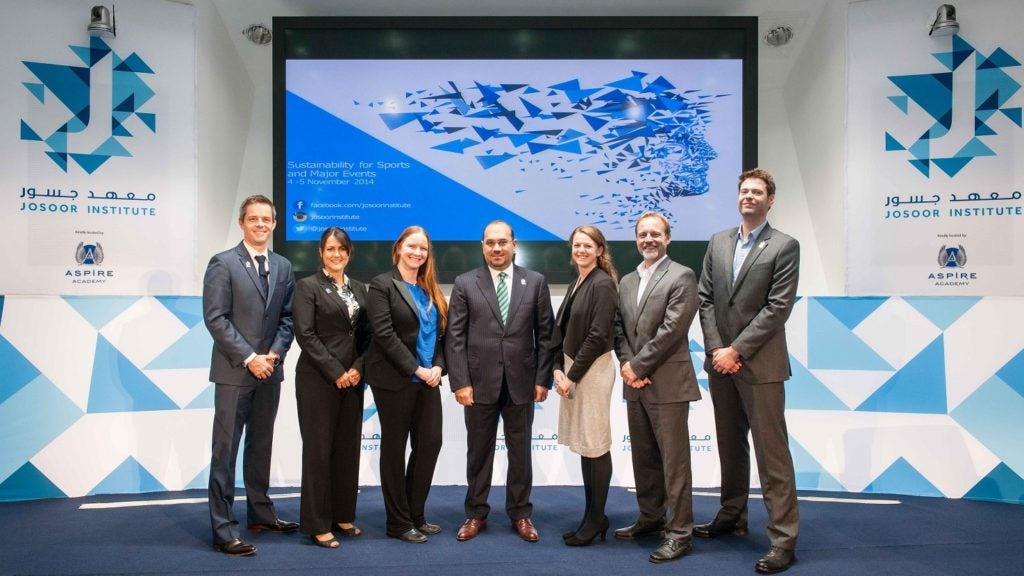Spotlight on Sustainability in Sports at Josoor Institute

A panel of internationally renowned experts are meeting at the Aspire Academy in Doha, Qatar, on 4-5 November 2014 to deliver a Josoor Institute course focusing on creating sustainability for sports and major events in Qatar, the Middle East and North Africa (MENA). Titled ‘Sustainability for Sports & Major Events’, the course is being been attended by over 70 delegates from Qatar and the region, including FAs of Iran, Iraq, Jordan, Kuwait, Yemen and Tunis.
This introductory two-day course, hosted during the Doha GOALS Forum, examines sustainability for sports and major events from an environmental, social and economic perspective. It also examines the global implications facing sports and events practitioners in the region. As Qatar looks to host more international events building up to the FIFA World Cup™ in 2022 and continuing with its drive for sustainable stadia design, the course draws global and regional best practice to one platform.
Qatar’s bid for the 2022 FIFA World Cup™ focused heavily on sustainability and the environment, and the country is already a leading example when it comes to sustainable design. The venues that will be used for the 2022 FIFA World Cup™ can be a shining example of how sustainability can be applied to large sporting stadia. In this context, a case study titled ‘Achieving the gold standard in the creation of a sustainable venue’ was presented on the first day of the course highlighting the Qatar National Convention Centre, one of the country‘s largest venues, which was built according to LEED gold-certification standards, setting a new benchmark when it opened in 2011.
Speakers delivering sessions over the two days include Tamim El Abed, Lusail Stadium Manager at the Supreme Committee for Delivery & Legacy, who spoke about the vision for a socially, economically and environmentally sustainable Lusail precinct; Simon Lewis of Team Planet Sports, defined the meaning of sustainability and delivered a case study along with Meegan Jones, Founder of Greenshoot Pacific, on sustainable events. Furthermore, Jones is also delivering a session on planning sustainability strategies and systems.
Mushtaq Al-Waeli, Executive Director (acting) for Josoor Institute, said; “Our aim is to be a catalyst for transforming the sports and events industries in the region, ensuring local and regional practitioners have the skills required to successfully deliver large-scale events and set new standards globally. Sustainability is an integral aspect of any major event, be it in sport or other industries. As Qatar looks towards the 2022 World Cup, we want to make sure those involved in the planning process have the knowledge to adopt the best practice in sustainability from around the world and apply them to events in the region, leaving a lasting social and environmental legacy.”
Launched at Doha Goals 2013, Josoor Institute is training many of the people who will play an integral role in Qatar’s hosting of the 2022 FIFA World Cup™, individuals who will then have the knowledge to deliver large-scale sporting and non-sporting events across the region long after 2022. Josoor Institute is proud to be affiliated with Georgetown University, a leading academic and research institution. Named as Josoor Institute’s institutional and lead academic partner, Georgetown University will provide academic and administrative support, which includes collaboration and innovation in the areas related to curriculum development, quality management, oversight and endorsement for short courses and the development of the academic framework and co-development of content for long courses.
Since its inception seven short courses, one outreach day and one bespoke course for the players of the Qatar Stars League have been conducted. These have featured 58 world class speakers with more than 660 delegates from 49 countries attending.
Josoor Institute will be introducing a set of lengthier courses in early 2015, which will offer professional certificates and diplomas. These more in-depth educational programmes are designed to give a deeper understanding of the industry and develop the skills required to work in sports and events for those leaving higher education or those planning a career.